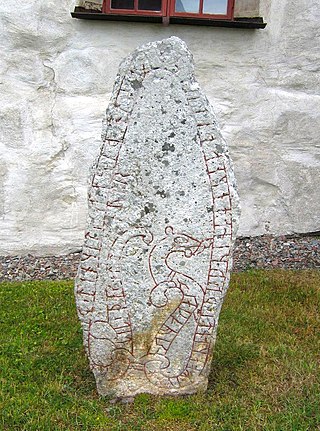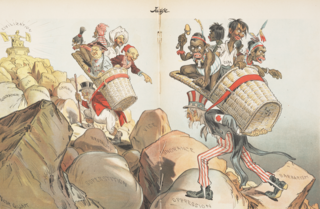Related Research Articles
Ælfheah, more commonly known today as Alphege, was an Anglo-Saxon Bishop of Winchester, later Archbishop of Canterbury. He became an anchorite before being elected abbot of Bath Abbey. His reputation for piety and sanctity led to his promotion to the episcopate and, eventually, to his becoming archbishop. Ælfheah furthered the cult of Dunstan and also encouraged learning. He was captured by Viking raiders in 1011 during the siege of Canterbury and killed by them the following year after refusing to allow himself to be ransomed. Ælfheah was canonised as a saint in 1078. Thomas Becket, a later Archbishop of Canterbury, prayed to Ælfheah just before his murder in Canterbury Cathedral in 1170.

Æthelred II, known as Æthelred the Unready, was King of the English from 978 to 1013 and again from 1014 until his death in 1016. His epithet comes from the Old English word unræd meaning "poorly advised"; it is a pun on his name, which means "well advised".

Year 1002 (MII) was a common year starting on Thursday of the Julian calendar.

Danegeld was a tax raised to pay tribute or protection money to the Viking raiders to save a land from being ravaged. It was called the geld or gafol in eleventh-century sources. It was characteristic of royal policy in both England and Francia during the ninth through eleventh centuries, collected both as tributary, to buy off the attackers, and as stipendiary, to pay the defensive forces. The term Danegeld did not appear until the late eleventh century. In Anglo-Saxon England tribute payments to the Danes was known as gafol and the levy raised to support the standing army, for the defence of the realm, was known as heregeld (army-tax).

"If—" is a poem by English poet Rudyard Kipling (1865–1936), written circa 1895 as a tribute to Leander Starr Jameson. It is a literary example of Victorian-era stoicism. The poem, first published in Rewards and Fairies (1910) following the story "Brother Square-Toes", is written in the form of paternal advice to the poet's son, John.

The Sermo Lupi ad Anglos is the title given to a homily composed in England between 1010 and 1016 by Wulfstan II, Archbishop of York, who commonly styled himself Lupus, or 'wolf' after the first element in his name [wulf-stan = 'wolf-stone']. Though the title is Latin, the work itself is written in Old English. The Sermo Lupi is Wulfstan's most well-known work. In it, he blames a lack of moral discipline amongst his fellow English as the source of God's anger against the English, which has taken the shape of thirty years of Viking raids against England. Wulfstan exhorts the English to behave in a manner more pleasing to God, and specifically to live according to the laws of the Church and of the king. The Sermo Lupi is noted for its rhetorical achievements, and is considered to represent the height of Wulfstan's skill as a homilist and rhetor. The text of the Sermo Lupi has been critically edited many times, most recently by Dorothy Bethurum. The work contains one of several mentions of Old English wælcyrian, a term cognate to the Old Norse valkyrjur—valkyries.

Thorkell the Tall, also known as Thorkell the High in the Anglo-Saxon Chronicle, was a prominent member of the Jomsviking order and a notable lord. He was a son of the Scanian chieftain Strut-Harald, and a brother of Jarl Sigvaldi, Hemingr and Tófa. Thorkell was the chief commander of the Jomsvikings and the legendary stronghold Jomsborg, on the Island of Wollin. He is also credited as having received the young Cnut the Great into his care and taken Cnut on raids. The Encomium Emmae, a document aimed at the movers and shakers of the Anglo-Scandinavian court in the early 1040s, describes Thorkell as a great war leader and warrior.

"The White Man's Burden" (1899), by Rudyard Kipling, is a poem about the Philippine–American War (1899–1902) that exhorts the United States to assume colonial control of the Filipino people and their country. Originally written to celebrate the Diamond Jubilee of Queen Victoria, the jingoistic poem was replaced with the sombre "Recessional" (1897), also a Kipling poem about empire.
Aldhun of Durham, also known as Ealdhun, was the last Bishop of Lindisfarne and the first Bishop of Durham. He was of "noble descent".
Sigeric was the Archbishop of Canterbury from 990 to 994. Educated at Glastonbury Abbey, he became a monk there before becoming an abbot and then Bishop of Ramsbury before his elevation to the archbishopric. An account of his pilgrimage to Rome in 990 survives and is an important source for historians studying Rome during his lifetime.
The St. Brice's Day massacre was a mass killing of Danes within England on 13 November 1002, on the order of King Æthelred the Unready of England. The Anglo-Saxon chronicle relates that the massacre was carried out in response to an accusation that the Danes would "beshrew [Æthelred] of his life, and afterwards all his council, and then have his kingdom without any resistance." King Æthelred thus ordered the killing of many Danes within his territory. The retaliation by the Danish King Sweyn Forkbeard over the next few years would earn Æthelred the nickname Æthelred the Ill-Advised.

"Mandalay" is a poem by Rudyard Kipling, written and published in 1890, and first collected in Barrack-Room Ballads, and Other Verses in 1892. The poem is set in colonial Burma, then part of British India. The protagonist is a Cockney working-class soldier, back in grey, restrictive London, recalling the time he felt free and had a Burmese girlfriend, now unattainably far away.

The Thingmen was a unit in the service of the Kings of England during the period 1013–1051, financed by direct taxation which had its origins in the tribute known as Danegeld. It consisted mostly of men of Scandinavian descent and it had an initial strength of 3,000 housecarls and a fleet of 40 ships, which was subsequently reduced. Its last remnant was disbanded by Edward the Confessor in 1051.
Events from the 1010s in England.
Events from the 1000s in England.
Events from the 10th century in the Kingdom of England.
"The Ballad of East and West" is a poem by Rudyard Kipling. It was first published in 1889, and has been much collected and anthologized since.
"Big Steamers" is a poem by Rudyard Kipling, first published in 1911 as one of his twenty-three poems written specially for C. R. L. Fletcher's "A School History of England". It appears in the last chapter of the book. It is intended for children, with the verses responding with facts and humour to their curiosity about the 'big steamers' - as the merchant ships are called.
A Choice of Kipling's Verse, made by T. S. Eliot, with an essay on Rudyard Kipling is a book first published in December 1941. It is in two parts. The first part is an essay by American-born British poet T. S. Eliot (1888–1965), in which he discusses the nature and stature of British poet Rudyard Kipling (1865–1936). The second part consists of Eliot's selection from Kipling's poems.
The Anglo-Saxon peace treaty between Æthelred II of England and the vikings was established following the defeat of the English forces against a viking army at the Battle of Maldon, after which viking invaders raided and tormented the regions of Kent, Hampshire and western Wessex for a period of four months. The treaty was arranged with the raiders by Sigeric, the Archbishop of Canterbury, and two ealdormen from the West Saxon provinces, known as Aelfric and Æthelweard. The treaty indicates that the most influential leader of the vikings was Olaf Tryggvason, who would later go on to become king of Norway.
References
- ↑ Kipling, Rudyard (1940). Rudyard Kipling's Verse (Definitive ed.). Garden City, NY: Doubleday. pp. 716-717. OCLC 225762741.
- ↑ Æthelred's nickname "Unready" derives from Old English unræd –meaning badly advised or foolish, not the modern sense of poorly prepared.
- 1 2 Keating, Peter (8 July 2005). ""Dane-geld" - Notes on the text". Kipling Society . Retrieved 15 July 2017.
- 1 2 Keating, Peter (8 July 2005). ""Dane-geld" (AD 980-1016)". Kipling Society . Retrieved 15 July 2017.
- 1 2 Abels, Richard (17 March 2008). "10. Paying the Danegeld: Anglo-Saxon peacemaking with vikings". In de Souza, Philip; France, John (eds.). War and Peace in Ancient and Medieval History. Cambridge University Press. p. 173. ISBN 978-0521817035 . Retrieved 15 July 2017.
- 1 2 Moen, Ole Martin (5 August 2011). "Danegeld". University of Oxford . Retrieved 15 July 2017. Original publication Ole Martin Moen, The Washington Times , 14 July 2011.
- ↑ Orwell, George (February 1942). "Rudyard Kipling". Horizon . Retrieved 16 July 2017.